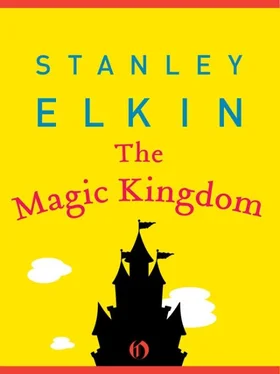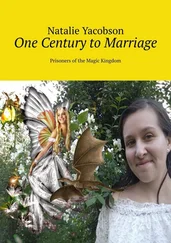“Oh?”
“Though I shall always half love you.”
Janet Order, Nedra Carp suddenly finds herself thinking, Janet Order, Janet Order. Livid Janet Order, Little Girl Blue, she thinks, who seems to defy Nedra’s longtime policies of bought-and-paid-for hired-hand love — it was, she acknowledged, a flaw — and old propinquitous patriotics and aversives, her dependence, for example, on the authorized and her slavish regard for her charges, the affront, for example, she took at just plain pure otherness, shared toilets and someone else’s hair in the comb, boxes of other women’s tampons and all the mnemonics of alternative being — it was a flaw, it was a flaw — her queasy antipatheticals and squeamish inimicals flaws (who would have resented Mary Cottle, for example, for no other reason than that she carried the Poppins baptismal name), her xenophobics and the coin’s other side, her played favorites flaws, flaws, her old pagan Thumbs Up, Thumbs Down determinations flaws, flaws, flaws.
But forgiving herself by the light and shine of her turned new leaf, Nedra feels sympathy for the girl who went both of them one better. Janet Order, she thinks, quite simply, quite suddenly awed. Janet Order. Janet Order. Who was herself a bruise, her entire body one brute blue stigma.
While in Mary Cottle’s room, Mr. Moorhead examined his Jew.
Because he was enough of a social animal never to volunteer at parties and gatherings that he was a pediatrician, or even an ex-casualty-ward physician. (But not courageous enough an egoist to proclaim himself, though he believed himself to be — and may in fact have been — one of the best diagnosticians in the world. And never mentioned what he absolutely knew to be the case: that what he really was was the finest prognostician ever to have lived. And though he may have wanted, at one of the Queen’s garden parties, say, to blurt this out to those stuffy O.B.E.’s, he knew well enough what the upshot would be — they would put him down as demented — and held his tongue. But give him credit, Mr. Moorhead thought. It was out of neither modesty nor fear that he failed to offer his strong suit. It was good, honest prudence. The fact was, his gift was a curse. He knew outcomes. He knew when people would die. He handicapped death. And while he might have been no master of the social graces, he knew enough about human nature to realize that unless a person was a pretty good sport, reeling off his mortality table might be too off-putting. They’d mark him down, he giggled, as a wet blanket at Her Majesty’s garden parties!
(Once he had. It was the first time he’d been asked to one, and he was a little squiffed. He’d boasted his forte to an eminent philanthropist. The man had been fascinated, telling the physician his medical history, leading him on to that point in the conversation where he was about to ask the awful question. Moorhead saw it coming — he was, after all, a prognostician — but there was no way to stop him. “I’ve told you,” he said at last, “more than a little bit about myself. So what do you think? What do you think, eh?” Sometimes knowing that a thing will happen provides the opportunity to deal with it when it does — he was, after all, a doctor — and he was ready for him. “Sir,” Moorhead told him indignantly, “I’m neither spiritualist, fortuneteller, nor flim-flam man. I’m a scientist. I will not perform parlor tricks for you!” And nervously awaited the millionaire’s reaction, which even to Moorhead’s half-slewed mind was a beat too long in coming. The fellow looked round slowly, taking in Buckingham Palace’s lush grounds, the ceremonial costumes of the guards, the fringed extravagant tents standing like Camelot. “Some parlor,” he said as Moorhead moved off. He was a pediatrician and knew a thing or two about childishness as well as about children and wasn’t surprised to see the man looking after him, Moorhead trying to lose himself among the other guests when the old boy came up to him again and actually ignoring him when he — he was a full-fledged Sir, one of the wealthiest men in England, and, in Mr. Moorhead’s best professional judgment, would not last two years — tried to intrude on the pediatrician and his new companions.) So when they asked, he simply told them “physician,” letting it go at that, knowing human nature well enough to understand that everyone wanted to learn about his symptoms, offering up their bodies like patriots, volunteers, recruits of their own raw mortality.
He didn’t mind these intrusions. He didn’t mind people picking his brains. In fact, he welcomed it. But he needed data. These weren’t data. They were anecdotal evidence, loose, quick- draw evaluations made at parties and never followed up by examinations and tests, the obituaries he sometimes spotted in the papers the only corroboration of his findings.
So when he asked the woman the time — he’d been hanging about the fringes of the queue looking impatient, as if he’d been stood up — and saw the bracelet of tattooed numbers on her arm, he shrugged his disgust at other people’s unreliability and drifted into line beside her. He offered small talk about the queue’s progress — he said “queue,” hoping she’d pick up on the foreign-sounding word — about the park’s attractions, his accommodations, about, finally, what he was doing in Florida. An international medical convention in Miami, he said.
“You’re a doctor?”
“Yes,” he said, “a physician. Yes. I am. From England.”
“From En gland,” she said. “I lived in England. In Liverpool.”
“Did you?” he said. “I had a surgery in Liverpool after I came down from university. This would have been around ’57. There were still refugees about. From the camps.”
He had to raise his voice over the ruckus of the Country Bear Jamboree. After the show his colleague had still not shown up, and he asked if she cared to join him for lunch at the Liberty Tree Tavern. They could have a schnaps, he said.
The woman — he judged her to be about the same age he was, perhaps a year or two older; she would have been eighteen or nineteen after the war — declined and said she was tired and thought she would return to her room for a nap.
He walked along beside her for a while in silence.
“Look,” he said at last, “I don’t mean to pry, but has anyone ever triangulated those cysts on your face?”
So now, two days later, she is lying on Mary Cottle’s bed in her slip. She has complaints but Moorhead has shushed her, explaining that too much has been made lately of patient feedback, that a diagnosis independently arrived at is more likely to be sound than one in which the patient leads her doctor around by the nose.
He finishes his examination and is returning his instruments to the black leather bag.
“You may put your clothes on,” he says and hands the woman her dress. He goes into Mary Cottle’s bathroom and washes his hands in Mary Cottle’s sink.
“So what’s the story?” she asks when he’s back in the room. “Will I live?”
Mr. Moorhead frowns. “Obviously”—he indicates the room—“the facilities in here — Tell me, Mama, have you any family pictures?”
“Pictures.”
“Family pictures.”
“To tell you the truth, Doc, I don’t make a move without my snaps, but no one ever asked before.”
“I’m looking for possible genetic pathologies.”
“Oh,” she says, “genetic pathologies,” and hunts about in her big purse. She digs out a large blue plastic holder like an oversized wallet. It is held together by rubber bands and is stuffed with photographs.
Mr. Moorhead takes a ballpoint pen from Mary Cottle’s desk drawer, some hotel stationery, seats himself at the desk, turns on the three-way lamp to its highest position, pulls a chair over for the woman, and inserts the jeweler’s loupe in his eye.
Читать дальше












